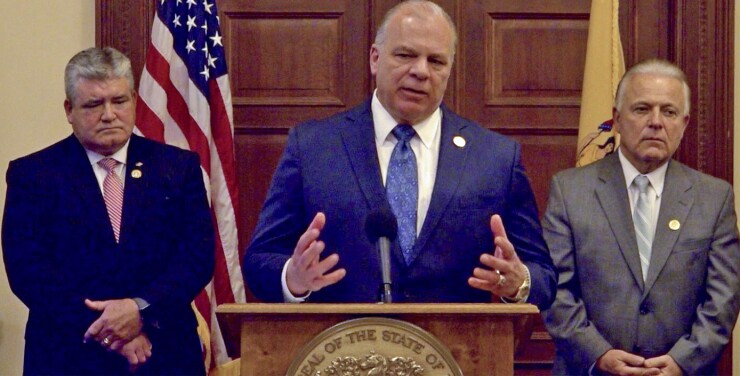New Jersey Gov. Phil Murphy reached a deal with Democratic state legislative leaders to implement nearly $10 billion of borrowing to fill revenue shortfalls driven by the COVID-19 pandemic.
The deal faces a legal showdown with state Republican leaders who call the plan “unconstitutional."
The bill, which is slated for a vote Thursday in the Senate and Assembly, allows the state to issue general obligation bonds with maturates of up to 35 years, or short-term debt, through the Federal Reserve’s Municipal Lending Facility program.
The agreement that Gov. Phil Murphy, a Democrat reached with Senate President Steve Sweeney, D-Gloucester, and Assembly Speaker Craig Coughlin, D-Fords, enables the state to borrow up to $9.9 billion as way to combat an estimated $10 billion revenue drop

“This agreement will ensure we will have the resources needed to respond to this fiscal and economic crisis in a responsible way,” Sweeney said in a statement.
Republicans hold little power in stopping the bonding measure in the Legislature, but GOP lawmakers have announced plans to file a lawsuit as a way of slowing down the process arguing that GO bonds require voter approval under New Jersey’s constitution.
Sweeney had been withholding support from Murphy’s
Robert Kenney, a spokesman for New Jersey Senate Republicans, said any GOP legal challenge would be spearheaded by the state’s Republican State Committee. The committee’s press office did not immediately respond for comment on a timetable for filing suit.
“The borrowing will make the problem much worst by adding tens of millions of dollars of interest payments and hundreds of millions of dollars of financial fees and commissions,” said State Sen. Samuel Thompson, R-Old Bridge, during a Senate Banking Committee hearing Tuesday. “The borrowing is incredibly irresponsible.”
Proposal backers have argued that state constitution provides exceptions for borrowing to sustain operating costs absence voter approval during a major emergency and the COVID-19 pandemic would fall into that category.
The revised bonding measure enables the Murphy administration to bond up to $2.7 billion by the end of the
New Jersey's current 6.625% state sales tax and local property taxes collected by municipalities would be increased if general budget revenues are insufficient to meet debt service requirements, according to the bill.
Richard Keevey, an executive in residence at the Bloustein School of Planning at Policy at Rutgers University, is against borrowing to sustain operating costs calling it unconstitutional and “bad public policy” by creating a one-time revenue source while adding hundreds of millions in debt service costs. Keevey, a former New Jersey budget director and state comptroller, said the state should instead raise taxes as well as look more seriously at budgetary savings such as deferring most of the planned $4.6 billion pension payments proposed in Murphy’s original budget proposal
"It is best to bite the bullet for the remainder of this year and next than to invite fiscal struggle for many years", Keevey said.
New Jersey’s GO bond ratings are second lowest of all U.S. states ahead of only Illinois due largely to an escalating pension burden. Fitch Ratings
New Jersey had $44.4 billion of outstanding bonded debt as of June 30, 2019, according to the state's latest annual
Fitch analyst Marcy Block said how bonds are structured and the ultimate budgetary impact on debt service payments from the borrowing will play a large factor in whether New Jersey will be at risk for a further downgrade.
“We would need to see if this severely impacts their spending flexibility,” Block said. “The idea of deficit borrowing or borrowing for liquidity doesn’t have the same amount of negativity as it normally does, but this is a large amount of borrowing.”





